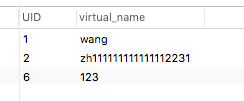背景
上文我们简要介绍了一些关于json的查询语句Mysql5.7学习之json类型(一)
我们也观察到了展示结果和查询其实有双引号的区别。
如果只是这样的查询也太小看mysql了。毕竟随着业务的数量增多 数据极速的膨胀
能否在json列中使用索引呢???
问题
explain select * from user where json_extract(data,'$.uid')='wang';
查看执行计划

type为all啥索引都没有 如果我有100w数据岂不……
As noted elsewhere, JSON columns cannot be indexed directly. To create an index that references such a column indirectly, you can define a generated column that extracts the information that should be indexed, then create an index on the generated column
解析
如果我们常见的查询条件都是某个对应字段 比如$.name
首先我们可以给对应的列加上虚拟列
虚拟列给我们解决了一个困扰许久的问题
很久之前我们就有需要基于数据处理的索引
比如表如下
CREATE TABLE `ontime` ( `id` int(11) NOT NULL AUTO_INCREMENT, `FlightDate` date DEFAULT NULL, `Carrier` char(2) DEFAULT NULL, `OriginAirportID` int(11) DEFAULT NULL, `OriginCityName` varchar(100) DEFAULT NULL, `OriginState` char(2) DEFAULT NULL, `DestAirportID` int(11) DEFAULT NULL, `DestCityName` varchar(100) DEFAULT NULL, `DestState` char(2) DEFAULT NULL, `DepDelayMinutes` int(11) DEFAULT NULL, `ArrDelayMinutes` int(11) DEFAULT NULL, `Cancelled` tinyint(4) DEFAULT NULL, `CancellationCode` char(1) DEFAULT NULL, `Diverted` tinyint(4) DEFAULT NULL, PRIMARY KEY (`id`), KEY `FlightDate` (`FlightDate`) ) ENGINE=InnoDB
需要统计一些信息的时候如下
EXPLAIN SELECT carrier, count(*) FROM ontime_sm WHERE dayofweek(FlightDate) = 7 group by carrier
id: 1 select_type: SIMPLE table: ontime_sm type: ALL possible_keys: NULL key: NULL key_len: NULL ref: NULL rows: 151253427 Extra: Using where; Using temporary; Using filesort Results: 32 rows in set (1 min 57.93 sec)
有个简单的方法可以建立触发器 在做插入或者更新的时候直接更新某个字段 直接使用该字段进行查询
CREATE DEFINER = CURRENT_USER TRIGGER ontime_insert BEFORE INSERT ON ontime_sm_triggers FOR EACH ROW SET NEW.Flight_dayofweek = dayofweek(NEW.FlightDate);
哈哈 当有了虚拟列的时候
直接这样
CREATE TABLE `ontime_sm_virtual` ( `id` int(11) NOT NULL AUTO_INCREMENT, `FlightDate` date DEFAULT NULL, `Carrier` char(2) DEFAULT NULL, `OriginAirportID` int(11) DEFAULT NULL, `OriginCityName` varchar(100) DEFAULT NULL, `OriginState` char(2) DEFAULT NULL, `DestAirportID` int(11) DEFAULT NULL, `DestCityName` varchar(100) DEFAULT NULL, `DestState` char(2) DEFAULT NULL, `DepDelayMinutes` int(11) DEFAULT NULL, `ArrDelayMinutes` int(11) DEFAULT NULL, `Cancelled` tinyint(4) DEFAULT NULL, `CancellationCode` char(1) DEFAULT NULL, `Diverted` tinyint(4) DEFAULT NULL, `CRSElapsedTime` int(11) DEFAULT NULL, `ActualElapsedTime` int(11) DEFAULT NULL, `AirTime` int(11) DEFAULT NULL, `Flights` int(11) DEFAULT NULL, `Distance` int(11) DEFAULT NULL, `Flight_dayofweek` tinyint(4) GENERATED ALWAYS AS (dayofweek(FlightDate)) VIRTUAL, PRIMARY KEY (`id`), KEY `Flight_dayofweek` (`Flight_dayofweek`), ) ENGINE=InnoDB
逆天了===》函数列 并且更重要的是支持索引!!!
这样的话我们完全可以
EXPLAIN SELECT carrier, count(*) FROM ontime_sm_virtual WHERE Flight_dayofweek = 7 group by carrier
*************************** 1. row *************************** id: 1 select_type: SIMPLE table: ontime_sm_virtual partitions: NULL type: ref possible_keys: Flight_dayofweek key: Flight_dayofweek key_len: 2 ref: const rows: 165409 filtered: 100.00 Extra: Using where; Using temporary; Using filesort
这种结果真真是太棒了!!!
结论
这个和json结合起来使用真是太棒了吧!!!
以刚才的表为例
我们使用虚拟列创建name_virtual
ALTER TABLE `f6db_20160522`.`user` ADD COLUMN `virtual_name` varchar(20) GENERATED ALWAYS AS (data->>"$.name") VIRTUAL NULL AFTER `data`;
这样简直完美

select UID,virtual_name from user where virtual_name is not null

完全看不出来这是个json表呢




